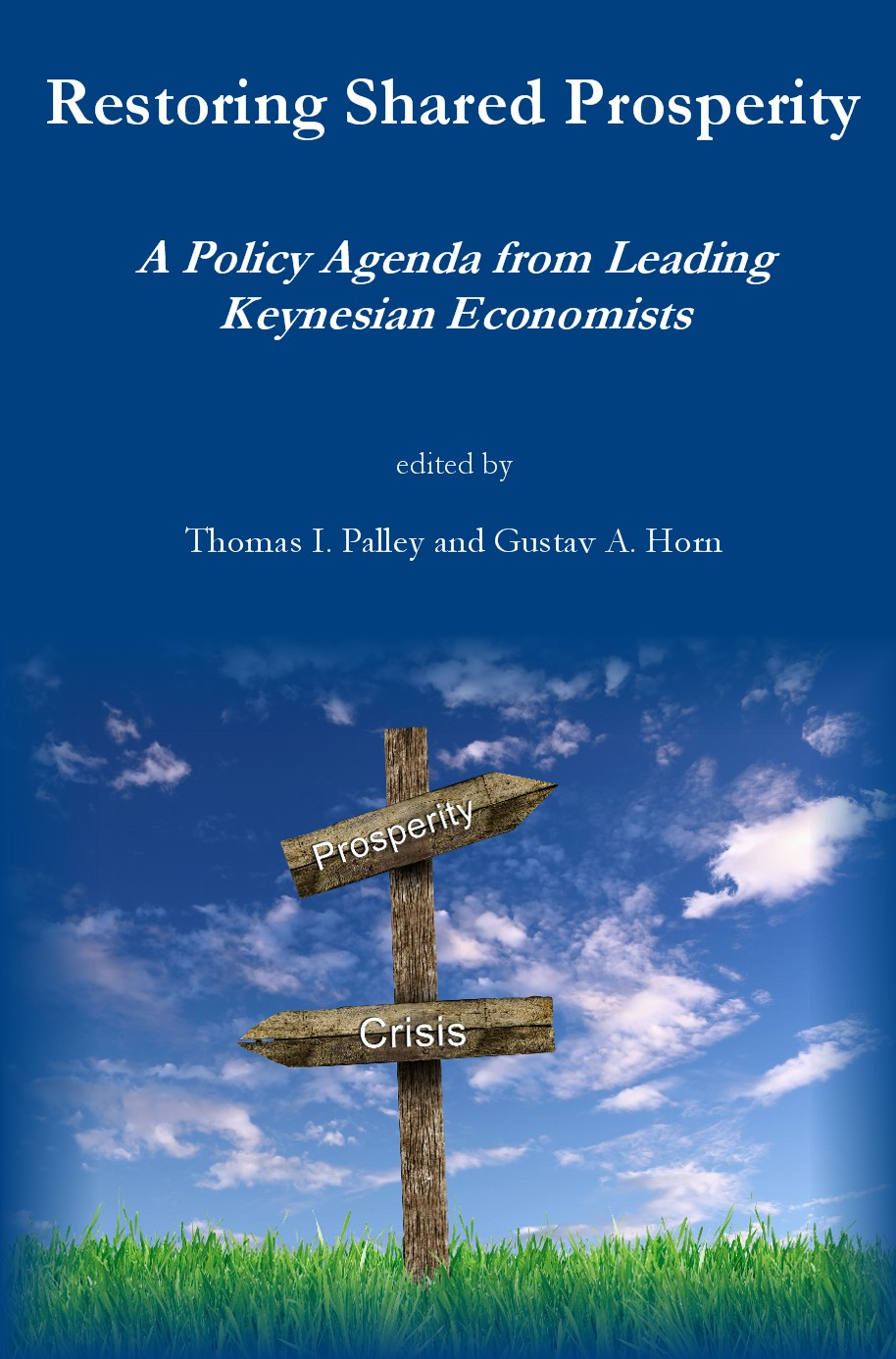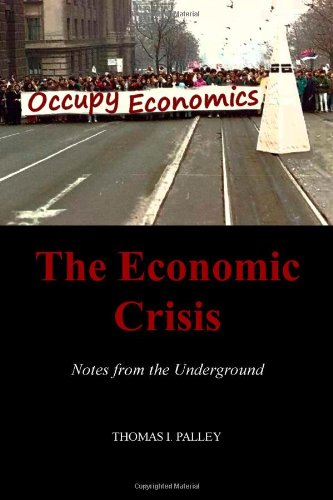Prior to the 2008 financial crisis there was much debate about global trade imbalances. Prima facie, the imbalances seem a significant problem. However, acknowledging that would question mainstream economics’ celebratory stance toward globalization. That tension prompted an array of explanations which explained the imbalances while retaining the claim that globalization is economically beneficial. This paper surveys those new theories. It contrasts them with the structural Keynesian explanation that views the imbalances as an inevitable consequence of neoliberal globalization. The paper also describes how globalization created a political economy that supported the system despite its proclivity to generate trade imbalances. [READ MORE]
Archive for the ‘U.S. Policy’ Category
The theory of global imbalances: mainstream economics vs. structural Keynesianism
Thursday, August 7th, 2014Monetary policy after quantitative easing: The case for asset based reserve requirements (ABRR)
Wednesday, April 9th, 2014This paper critiques the Federal Reserve’s quantitative easing (QE) exit strategy which aims to deactivate excess liquidity via higher interest rates on reserves. That is equivalent to giving banks a tax cut at the public’s expense. It also risks domestic and international financial market turmoil. The paper proposes an alternative exit strategy based on ABRR which avoids the adverse fiscal and financial market impacts of higher interest rates. ABRR also increase the number of monetary policy instruments which can permanently improve policy. This is especially beneficial for euro zone countries. Furthermore, ABRR yield fiscal benefits via increased seignorage and can shrink a financial sector that is too large.
Explaining Stagnation: Why it Matters
Monday, February 24th, 2014Larry Summers (HERE) and Paul Krugman (HERE) have recently identified the phenomenon of stagnation. Given that they are giants in today’s economic policy conversation, their views have naturally received enormous attention. That attention is very welcome because the issue is so important. However, there is also a danger that their dominance risks crowding out other explanations of stagnation, thereby short-circuiting debate.
Krugman has long emphasized the liquidity trap – zero lower bound to interest rates which supposedly prevents spending from reaching a level sufficient for full employment. Summers has added to this story by saying we have been in the throes of stagnation for a long while, but that has been obscured by years of serial asset price bubbles. (more…)
New Book: Restoring Shared Prosperity: a Policy Agenda from Leading Keynesian Economists
Friday, December 20th, 2013 Edited by Thomas I. Palley and Gustav A. Horn. The economic recovery in the US since the Great Recession has remained sub-par and beset by persistent fear it might weaken again. Even if that is avoided, the most likely outcome is continued weak growth, accompanied by high unemployment and historically high levels of income inequality. In Europe, the recovery from the Great Recession has been even worse, with the euro zone beset by an unresolved euro crisis that has already contributed to a double-dip recession in the region. This book offers an alternative agenda for shared prosperity to that on offer from mainstream economists. The thinking is rooted in the Keynesian analytic tradition, which has been substantially vindicated by events. However, pure Keynesian macroeconomic analysis is supplemented by a focus on the institutions and policy interventions needed for an economy to generate productive full employment with contained income inequality. Such a perspective can be termed “structural Keynesianism”. These are critical times and the public deserves an open debate that does not arbitrarily or ideologically lock out alternative perspectives and policy ideas. The book contains a collection of essays that offer a credible policy program for shared prosperity, rooted in a clear narrative that cuts through the economic confusions that currently bedevil debate.
Edited by Thomas I. Palley and Gustav A. Horn. The economic recovery in the US since the Great Recession has remained sub-par and beset by persistent fear it might weaken again. Even if that is avoided, the most likely outcome is continued weak growth, accompanied by high unemployment and historically high levels of income inequality. In Europe, the recovery from the Great Recession has been even worse, with the euro zone beset by an unresolved euro crisis that has already contributed to a double-dip recession in the region. This book offers an alternative agenda for shared prosperity to that on offer from mainstream economists. The thinking is rooted in the Keynesian analytic tradition, which has been substantially vindicated by events. However, pure Keynesian macroeconomic analysis is supplemented by a focus on the institutions and policy interventions needed for an economy to generate productive full employment with contained income inequality. Such a perspective can be termed “structural Keynesianism”. These are critical times and the public deserves an open debate that does not arbitrarily or ideologically lock out alternative perspectives and policy ideas. The book contains a collection of essays that offer a credible policy program for shared prosperity, rooted in a clear narrative that cuts through the economic confusions that currently bedevil debate.
Contributions by Richard L Trumka, Thomas I Palley, Gustav A. Horn, Andreas Botsch, Josh Bivens, Achim Truger, Jared Bernstein, Robert Pollin, Dean Baker, Gerald Epstein, Damon Silvers, Jennifer Taub, Silke Tober, Jan Priewe, John Schmidt, Heidi Shierholz, William E Spriggs, Eckhard Hein, Heiner Flassbeck, Gerhard Bosch, Michael Dauderstädt
The book is available for $7.52 at AMAZON.COM
The Next Federal Reserve Chairperson
Monday, July 29th, 2013Some months ago it became known that Federal Reserve Chairman Ben Bernanke was likely to step down as the end of his second term of appointment drew near. Initially, Federal Reserve Vice-Chair Janet Yellen appeared the favorite to succeed Bernanke, but now it seems as though Larry Summers has become the Obama administration’s preferred candidate. Summers’ candidacy raises grave political and policy concerns. (more…)
Coordinate Currencies or Stagnate
Wednesday, July 10th, 2013The global economy needs exchange rate coordination now. Absent that, the world is likely to be increasingly afflicted by exchange rate fluctuations and policy acrimony. These are bound to undermine the economic recovery and increase the likelihood of stagnation.
In 2010, Brazilian Finance Minister Guido Mantega warned of the possibility of “currency wars”, as countries sought to devalue their exchange rates to gain competitive advantage. (more…)
Putting Finance Back in the Box
Monday, February 18th, 2013Financial sector reform has been at the center of the post-crisis policy debate but, so far, discussion and legislative action has been almost exclusively about issues of “stability” and preventing a repeat of the crisis.
However, just as important, if not more so, is the effect of financial markets on “equity” and economic “efficiency”. Yet here, the reform debate has been almost totally silent. By restricting the debate to stability, the economic winners have been able to shut down the case for deeper systemic reform. (more…)
Yellen to Washington D.C.: Fiscal Austerity Slows Recovery
Tuesday, February 12th, 2013Last Monday, Federal Reserve Vice-Chair Janet Yellen gave the keynote speech at an AFL-CIO economic policy conference on restoring shared prosperity.
Dr. Yellen began by noting that the Federal Reserve “is the only agency assigned the job of pursuing maximum employment.” She then went on to acknowledge “the gulf between maximum employment and the very difficult conditions workers face today.” That gulf is the reason behind the Federal Reserve’s on-going actions to strengthen the recovery and why there is continued need for “forceful action to increase the pace of economic growth and job creation”. (more…)
New book from Thomas Palley “The Economic Crisis: Notes from the Underground”
Thursday, August 9th, 2012The Economic Crisis: Notes from the Underground
by Thomas I. Palley, Createspace, 2012
This book provides a collection of short essays detailing the causes of the economic crisis and the failure of the economics profession to foresee and explain it. An old adage is “The winners get to write history” and that is proving true in the current moment. Open any major newspaper and the op-ed page contains articles by the same economists and policymakers as before the financial crash of 2008. One myth the winners are looking to promulgate is the crisis was not predicted and not predictable. This claim has a purpose as it excuses the economics profession from its catastrophic intellectual failure. The book challenges this “winners’ version of history” by showing the crisis was predictable and foreseen. The articles provide easy access to both theoretical and policy controversies that continue to be important, and they also show little has been done to fix the root problems. The academy is a club and it resists change because club members benefit from their intellectual monopoly. This monopoly means politicians are all fed roughly the same policy diet. Politicians are also subject to the pull of money and money likes the existing mainstream economic paradigm. Together, this constitutes a powerful sociological system that is hard to crack. Part of cracking it is exposing the failure of economists by showing the crisis was foretold and predicted.
A Keynesian Theory of Hegemonic Currencies – Or Why the World Pays Dollar Tribute
Thursday, August 9th, 2012Several years ago (June 2006) I wrote an article advancing a new theory of why the dollar is the world’s dominant currency and why it is likely to remain so. The article was published in the midst of the last boom and sank like a stone. But now debate about the cause of the dollar’s hegemony has been revived in an interesting paper by Fields and Vernengo titled “Hegemonic currencies during the crisis: The dollar versus the euro in a Cartelist perspective” (also here). Their paper provides an opportunity to revive discussion, so I am posting the article again. Here it is (subject to a couple of word edits):
The U.S. dollar is much in the news these days and there is a sense that the world economy may have become excessively reliant on the dollar. This reliance smacks of dysfunctional co-dependence whereby the U.S. and the rest of the world both rely on the dollar’s strength, but neither is well served by it.
The U.S. dollar is the world’s premiere currency, with approximately two-thirds of world official foreign exchange holdings being dollars. Moreover, many countries appear willing to run sustained trade surpluses with the U.S., supplying everything from t-shirts to Porsches in return for additional dollar holdings. This willingness to exchange valuable resources for paper IOUs represents a form of dollar tribute. (more…)
